This story is a sequel to The Princess's Captain
There are more characters in The Princess's Captain than just Twilight Sparkle and Tempest Shadow. This will be a repository for stories that don't feature our main pairing quite as heavily, that take place in the middle of other stories, and/or that are simply not as important to the main plot. Every one of these stories is canon, however, so the reader is advised to keep up with them! Standard warnings from The Princess's Captain apply here, as well. See below for timeline information.
Cover art by Arcane-Thunder!
Down to Brass Tacks: Twilight and Tempest are summoned to Canterlot by the Cutie Map. Takes place after chapter 8 of A Princess's Trials.

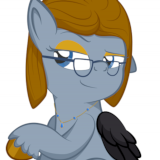





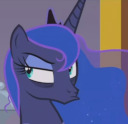


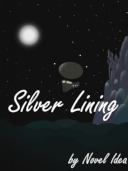
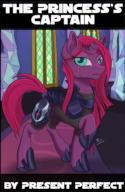










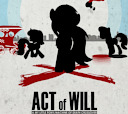



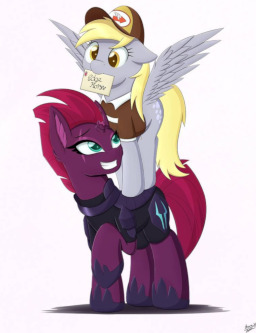
That cover image... Perfection.
Perfection.
I don't know whether to laugh or groan. The fact that they weren't even raised in the same home, implying that this is genetic... (or at least endemic to Canterlot.)
"It just works, Tempest. Poking into how just drops anvils on you."
"Are these anvils metaphorical, Your Highness?"
"I wish."
Yes.
Ahem. In any case, excellently done friendship problem. I should give this sort of plot a try; don't believe I ever have. I can see why you spun this off of the main story, but it was still a great read. Thanks for not letting it stay a noodle incident.
Did like the last thought. That simple and easy are not the same.
Alternators and actuators, what a fine story. Especially with
SexySassy Saddles' backstory...gotta say, I felt more sympathetic to her.Also, totally agree with 9848943 about the cover art.
As one of the covers of the Knightmare Knights comic arc shows, Tempest in fact looks fantastic in a suit.
See?
LOVED this! Tempest is already a better Friendship problem solver than Twilight and I love it.
9849118
Not a high bar to clear. Pretty sure on the few map missions she went on, Twilight was only ever an impediment.
9848971
In
warfriendship, everything is very simple, but even the simplest thing is difficult. - Clod Width's auf FreundlichkeitI'm as lost as Twilight on how that worked. And, for that matter, why Battlefront said what she said. (Invoking the blind seer trope?) Could someone explain?
9849340
It's true in a lot of things, just because a task is simple doesn't mean it's easy. Lifting heavy objects is simple, but it's not easy. Finding a job can be simple(though often isn't) but not easy.
9849389
Sometimes all people need is to be starkly and directly confronted with their problem, rather than manipulated into facing it. Tempest also took the time to look into the deeper problem the two faced as siblings and in themselves, rather than the surface problem of one merely snubbing the other an invitation.
9849524
You just reminded me of something the early Soviet Union under Lenin tried to set up. See, Karl Marx believed that the value of a thing, rather than being derived from the demand for a thing (i.e., the amount a person is willing to pay for it), was instead derived from the amount of physical labor and effort it took to create the thing. This was called the Labor Theory of Value
While novel and possibly even sensible at first glance, thinking about this for about five seconds leads you realize that a five-foot deep hole in the ground is more valuable than a poem. While I'll grant that this was basically true of most poetry produced in the Soviet Union, or even most poetry in general, we run into problems when you realize that this still applies to, for example, Shakespeare's sonnets - or, amusingly, the Communist Maifesto itself, once we realize that a sufficiently deep hole will be worth more than any prose.
Nevertheless, Lenin was guzzling enough of Marx's Kool-aid, and the rest of Russia was guzzling Lenin's knockoff Kool-aid, so the Soviet Union between 1918 and 1921 under Lenin tried to implement something along these lines, a system of nonmonetary accounting that basically went something along the lines of "okay, so I deposited my kids at the day-care, so now I can withdraw the dishes from the sink". The results were predictable to everyone who wasn't Lenin or one of his Kool-aid guzzlers. The Soviet Union abandoned it (as it did most things Karl Marx), improved a little (as things inevitably do when they move away from Karl Marx) but not by a lot (because we're still starting out with a baseline of Karl motherfucking Marx), but Lenin nevertheless continued to construct a horrible nation of famine and misery until his death.
Yet the guy gets to be immortalized in a glass coffin and venerated like he was Malal or something.
9849101
oh shit :D I need to get back into reading those...
9849546
I get that the direct approach was what's called for. What I don't get is why those specific sentences did what they did. Why would reminding Brassy of his duty accomplish anything? And why would telling Sassy that her past was not today </sunsetshimmer> do anything but deal with her low self esteem?
9849686
The idea was that the grandmother in Brassy's family was the moral center and the one who laid down the exemplars of how to behave. And in Sassy's? Her mother. Tempest was just quoting both of them.
Twilight stared incredulously at Tempest's bizzare question as if she suggested something patently absurd like theorizing the tasty Alfalfa Green silage snack cakes were actually made of some mythological creature like a human or somesuch.
"Ignore a Friendship Quest?! A chance to address interpersonal issues between ponies? Ponies who are the prime movers behind every natural process here on Equus? Ponies who have nearly destroyed the planet because they were jealous of the adoration their older sister was receiving. Ponies who nearly brought about an extinction level ice-age because they refused to talk with one another? Ponies who have released an Eldritch Chaos god through their bickering? Who enslaved a borough because they got called out on their bragging? Ponies who have removed the very souls from their neighbours and repeatedly destroyed Equestria because their filly-hood colt-friend moved to a different town?"
Tempest took a step back, ears splayed back, under Twilight's withering questions. Twilight leaned forward and poked her Captain in the chest with the tip of her hoof.
"Ponies who became Henchpony and field commander of the belligerent forces in Equestria's fifth world war and invasion because of a sports injury with her filly-friends?"
"Oh..."
"But since you ask, Captain, I imagine that if these 'foalish' Friendship Quests are left unresolved, by the end of the month Equestria would either cease to exist, or all of Equus would be reduced to a fiery plasma of its constituent bosons, gluons, and thaumaturgical quibbs. or the very fabric of reality torn asunder while batrachian and tentacular horrors invade from the Dungeon Dimensions."
Twilight softened her glare and smiled sweetly at her down cast captain. "So let's try to resolve these issues before it gets to that stage, m'kay?"

9849869
How can something be both batrachian and tentacular...oh, the tentacles are shaped like frogs.
I don’t have nearly enough tea to deal with this.
Appallingly I am only able to like this once. Have a mustache!
Murk's enjoying this one very much thus far.
9850528
seconded
9849389
The second half of this comment has been sticking in my mind and finally made me realize there was a small detail left out of that scene. Ctrl-F "Battlefront" and see if it doesn't answer your question now. :)
a grate first chapter i really think this story has grate possibility.
9851612
Just so there's no confusion, Down to Brass Tacks is a single, complete story. Other entries in this anthology will be separate stories. Make sure you're reading The Princess's Captain to keep up!
9852186
i guessed that much.
i thought The Princess's Captain was finished with the epilogue but you just did not hit the finished button.
guess i best move it back to my active folder.
9852310
Yeah. That story's going to be running for a long time.
9852319

9850479
Ah, a man (Woman? Attack helicopter?) of impeccable taste and sophistication I see

When did Tempest turn into Twilight's wife?
9854674
Not yet D:
Hmmm Twilight didn't flip out over tempest in a suit.....
9855199
That's what you call hyperfocus. :B
9854922
But that'll be a running gag.
Aha, so I got an answer with the rest of the Mane Six letting them know that yes, the problem was in Canterlot. Nice. It's a minor detail but I was glad to see it noted since that did honestly throw me in the main story.
Shame Twilight doesn't seem to be worth much when actually picked for a Friendship Quest (and that's already rare). Then again, most writers don't seem to know what to do with her. For example, and since we're using a lot of movie plot and characters in this fic's continuity, count the number of times she teleported in the movie. Did you come up with 0? Yes, yes you did. Writers often nerf her because she's easier to write when she's not... well Twilight. And it's really easy to play to her faults and make her look incompetent to the point of downright stupidity, I mean who didn't just love Lesson Zero, am I right? What's the new term: Twily-nanners? So while I can't hold that against this story in particular... I admit it was disappointing.
Meanwhile Tempest almost immediately knows just what to say to each of these two problem... well siblings rather than friends but eh, close enough (especially since they didn't grow up together... and yet share that unusual verbal tic... huh...). Kudos to her; I guess she's a natural. I mean sure the Map is going to call the right ponies for the job but, with that in mind, why did it call Twilight here, again? To paraphrase the Bobs (Office Space, google it if you don't know) 'What would you say... she did here?'
Now, having said that, some positives. The problem itself, and the solution? Well-crafted. Haves and Have-nots really understanding each other is a very old problem and this was an interesting and creative take on that. The fact that, 'annoying' nature aside, each of these two could be turned around with a piercing phrase (gleaned from understanding where they were each coming from, at least to an extent) shows they both have good hearts despite their stubborn inability to empathize with one another.
It also speaks well of Tempest that she did take this problem seriously rather than just blowing off the somewhat frivolous pair. And it comes from her sense of duty to Twilight, and her commitment to bettering herself (the former of which being instrumental in reaching Brass here).
Overall? Nicely done and looking forward to the next installment here (as well as the main story, of course). Be nice if Twilight had more to do than fail, but that seems a tall order. Challenge extended...
Sensors and servos, that was a fun little sojourn. I loved Sassy's backstory. I was on a Sassy Saddles kick for a little while and this presentation of her makes her even more appealing to me. Good job presenting the friendship problem. While it was obvious to the reader it didn't feel forced. Thanks for creating and sharing.
Is it wrong that I questioned wether the end would be better if it had been a feghoot? I’ve come across so many of late.
9908381
Oof, tell me about it. D:
Are you gonna continue this
10316564
Eventually there'll be more, yeah. :) It's more likely that The Princess's Captain will be updated first (and it has been), so make sure you're following that, too!
10316602
I wanna see tempest meet shining armor
10316605
Eventually! :D
9908650
When eventually
10316686
I have a very long roadmap for this pair of stories and no particular timeline to write it on. :B
10316921
Why
10316922
because that's just how I do :B
10316925
Will it be the next chapter
10316928
I'm not planning to have them meet before the shipping begins.
10316942
I can already imagine his reaction to her
9849546
The Marxian theory of value is a lot more complicated than that (and he in fact cautioned against such crude understandings as "ascribing a supernatural creative power to labor"*); the concept Marx believed in may better be referred to as a dual (or even dialectical) theory of value because it refers to two seemingly mutually exclusive things that are both valid and can be exposed to observation by different contexts.
Basically, it was conceived to answer the question of how profit happens, microeconomically, and to solve the metaphysical dispute over value (encompassing bitterly contested questions regarding how to value objects and services and whence they got those values; the actual labour theory of value was in fact the position of one of these disputing sides, and dates back at least to Locke and possibly as far back as Thomas Aquinas).
In essence, Marx believed that there were multiple distinct meanings of value, related to how they were derived: In addition to a price (or 'exchange value') derived from how much people are willing to pay for something, there was the 'use value', derived from how much utility one gains by using something, and (implicit in the theory) a value derived from the cost of making something (ie, based on the cost of all of its factors of production)**.
The gap between the production value and the exchange value of a thing being made (or, more or less equivalently, between the exchange value and use value of its factors of production) causes profit, and does so in a way that is inherent to the theory rather than as an extra term or "fudge factor".
* Note that this sort of supernaturalising of human work is not unique or even particular to left-wing schools of thought; see, eg, Atlas Shrugged's treatment of its "heroes" and their intellectual labour (which is noted to be eerily similar to North Korean Kim-worship).
** There was an explicit attempt to formulate a "socially necessary labour time", but this was not an actual cost-to-produce but a theoretical minimum cost that no-one could improve upon even with perfect control of the means of production, barring technical improvements in production processes; also, precisely because it was a theoretical minimum cost rather than an in-practice cost, it simply proved impossible to calculate.
PS, regarding using labour time as a measure of value: Marx did attempt to measure cost-to-produce in labour-time (although not in person-hours); this was because labour is a required factor of production for basically everything, and it would have seemed easier to work with labour time directly than convert it into monetary costs (imagine trying to calculate distances if you had to measure them in litres of petrol and then convert litres back into kilometres at the end). Also, this was highly abstract stuff that never panned out; criticising him for measuring value in terms of "x% of society's labour-time" is like criticising a string theorist for measuring speed as "x% of the speed of light" (ie, in neither case is the choice of units the problem).
Also, the other contender for "universal measure of value" in Western economic thinking was the gold standard, most famously, and rightly, excoriated in William Jennings Bryan's "Cross of Gold" speech as causing enormous human suffering because of how out of touch it was with the real economy. Basically, rather than the central bank printing as much money as the economy needs to function, it would print as much money as people dug gold from the ground, meaning that the economy was held hostage to the luck of random prospectors (to be fair, however, this criticism also applies to gold-and-silver bimetallism, which Bryan supported instead, and to practically any commodity money).
10642078
Yes. That is the long explanation. And supply-and-demand is a lot more complicated than a seller simply setting a price at which he can find a buyer. Nevertheless, the simplified explanation does work to highlight just how bad at economics Marx fundamentally was and Marxism fundamentally is, at least when exposed to actual reality and forced to reconcile his various economic theories with how people actually behave. Everything you just typed up calls to mind nothing so much as the phrase “a little knowledge is a dangerous thing”, in the sense of the Dunning-Krueger effect; Marx had enough knowledge to write up and espouse these grand theories and make them sound quite intelligent, but not enough knowledge or real-world experience to understand just how fundamentally flawed they were.
Of course the truly dangerous thing is that I’ve met no small number of people who insist that Marx was right, it’s reality that’s wrong.
10642078
10642405
This is easily the strangest conversation that has ever occurred in one of my fics. <.<
10642594

I can drop it if you like.
10642405
As opposed to such rational and level-headed people as US Treasury Secretary Andrew Mellon, who decimated the American economy between 1929 and 1933 because he believed that depression was needed to "purge the rottenness from the system"? Or Joseph Schumpeter, who argued in 1934(!) that the Great Depression was to be welcomed as "something which has to be done"?
Or Eugene Fama, who in late 2007, as the Housing Bubble was blatantly obvious to any competent observer, minimised the possibility that houses might be irrationally overpriced because homebuyers carefully compare prices to those of other houses:
Was Marx wrong about a lot of things? Obviously. So was every other pre-Keynesian economist. In case you missed it, Keynesianism basically obsoleted Classical (eg Adam Smith, David Ricardo, and Marx himself), Neoclassical (the only one I can think of prior to the 1950s is Léon Walras, a key figure in the mathematisation of economics), and Austrian (Schumpeter, Hayek, and von Mises, as well as the aforementioned non-economist Mellon) economics.
Even so, claiming that he believed in the labour theory of value (especially as wilfully misrepresented in your first post) to the exclusion of any other theory of value is not a "simplified explanation" but simply historically illiterate, akin to believing that Christopher Columbus was involved in a dispute over whether the Earth was planar or spherical. Marx believed that there was not one single concept of value, but that there were multiple such concepts, that these concepts of value interact in economically interesting ways, and that "the amount a person is willing to pay for it" is one of those concepts of value. To say otherwise, after what he actually thought has been explained to you, is simply a lie.
And, even though he was wrong about why (and Keynesianism proved him wrong to think that market-based economic systems were fatally flawed), at least he understood that unregulated capitalism is inherently unstable, something many Neoclassical economists who ought to know better have been unwilling to accept.
(Speaking of getting things half-right, I shall give the Austrian school's otherwise cruel and Kafkaesque business cycle theory half-credit for admitting the existence of economic bubbles, or as they put it, "malinvestment")
Regarding absolute and unwavering believers in Marx: There are plenty of people, even many supposedly competent economists, who have the same fervor for Neoclassical economics (that article's author ascribes it to "mist[aking] beauty, clad in impressive-looking mathematics, for truth").
Also, regarding your first post and "Lenin's knockoff Kool-aid", the key to understanding Bolshevism in this context is not Communism or Marxism (the Mensheviks and Social Revolutionaries were also Communists and Marxists) but Lenin's desire to have an immediate and complete abruption with the past and his apparent belief that he could override human nature simply by force of ideology (the Mensheviks split from the Bolsheviks over Menshevik acknowledgement of the reality of human nature in the context of private property); this manifested in trying to rewrite the workweek to eliminate shared weekends and many other ill-thought-out ideas with no obvious connection to Marxism.